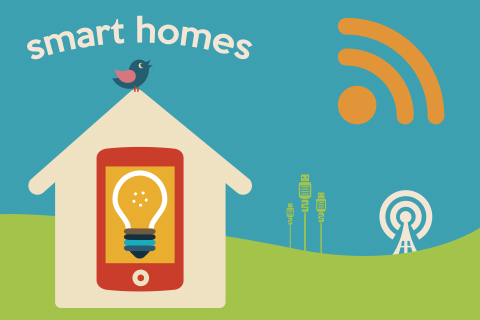
Fact: 46% of consumers want their current or next home to have smart home technology, according to Realtor magazine. However, in a recent survey, 22% of realtors said although their clients are interested in whole-home technology, more than 50% of them were unfamiliar with the types of smart technology available.
According to Realtor.com, smart home features boost a home’s resale value up to 5%—that means an additional $15,000 on a $300,000 home. Smart homes also can save money on energy costs, such as smart thermostats.
As it continues to evolve and become more common, your clients will have more questions about smart technology and its role in buying and selling a home. It’s time to get smart about smart homes!
What is a smart home?
A home with many devices interconnected via WiFi that work together to automate several of the home’s processes. Despite the cloud, WiFi, and all those other invisible technologies, homeowners still need a physical hub through which all of these devices run. That hub is the control center for every device.
What is a smart device?
Smart devices include instruments such as lights, thermostats, and locks that connect to the internet and to each other. Smart devices can be controlled remotely by a phone or a computer.
What types of smart devices are on the market now?
New smart devices are hitting the market all the time. But where it concerns homeowners, smart technology can be separated into two categories: safety and convenience. Let’s take a look at some of the hottest trends in both.
Smart Safety
63% of consumers cite home security as the biggest motivation to buy a smart home device. Here are a few of the top smart security devices available to homeowners.
Home Security. Smart security systems, like ADT’s Pulse, can control who has access to your home, and when. Homeowners can arm and disarm house alarms via their smart phone.
Lighting. Smart plugs can turn traditional lamps into smart devices. This give homeowners the ability to schedule lights to turn on at specific times of day, such as dusk, and off again once the light is no longer needed. They can also be activated and deactivated from a smart phone while homeowners are away.
Health. In addition to setting off alarms, smart smoke and carbon monoxide detectors can notify a homeowner’s cell phone when increased levels of each are present in the home.
Surveillance Cameras. These smart devices keep a literal eye on your home. Homeowners can position cameras at main entrances or other significant areas both in and outside the house. Video can be set to record for a period of time when the doorbell rings, for example, or when a door is opened. This provides extra assurance for homeowners who travel or parents of school age children who arrive home on their own. In addition to recording video, they can also set off alarms if necessary.
Smart Convenience
The convenience of smart devices can’t be denied. They can also save homeowners money, which is a big plus. Here are a few of the most popular convenience devices on the market:
Smart Thermostats. These devices allow homeowners to control a home’s temperature from a Smart phone. The ability to monitor heating and cooling usage, change temperatures based on time of day and outside temperature, and schedule changes based on time of year can save homeowners time and money. In fact, according to smart thermostat maker, Nest, consumers can save an average of 10 – 12% on heating and 15% on cooling (that’s an average savings of $131 to $145) a year.
Smart Ovens. Imagine being able to preheat the oven on your way home from work. Or check to make sure you turned the oven off after you’ve left the house. Homeowners can now take advantage of smart ovens that can be controlled via smart phone.
Outside. Even outside the home, devices are getting smarter. Automated sprinklers can be set to run for a specific amount of time. They are even smart enough to turn off if it starts to rain, or when the lawn has reached a specific saturation point.
Smart Fact: By 2020, it is predicted that there will be anywhere between 26 billion to 200 billion devices connected to the internet.
Smart Trends
According to a study by McKinsey consulting firm, 29 million homes will become connected in 2017, from 22 million in 2016.
Homeowners are willing to invest fairly significantly in smart home technology, especially if it means that their home will sell quicker. Those looking to buy feel the same way. Consumer Reports says that 86% of millennials searching for a home are interested in automated features. And according to Curbed, they’ll spend 3 to 5% more for a home with the right smart amenities. But they’re not the only demographic interested in this technology: 65% of baby boomers are also willing to pay extra for these features. [Read “How to Legally Market to Specific Demographics.”]
Smart Challenges
As with any technology, privacy can be a concern, especially for clients interested in purchasing a home equipped with smart devices. If your clients have questions, refer them to the Online Trust Alliance’s Smart Home Checklist for more information.
Keep up with client and potential client demands by understanding the pros and cons, costs and market availability of today’s smart homes.
Our Real Estate agents put clients’ interests above their own, providing the highest level of honesty and expertise before, during, and after each transaction. Sound like you? Find out what it takes to become part of the Vegas One Realty team here.
Looking for the perfect smart home? Start your search here!



